How Intensive Should Speech Therapy for Autism Be?
Most children with autism need to see a speech therapist to improve their communication skills; that’s just part of the nature of autism.
However, one very common misconception I see is that more time with the speech therapist will result in better communication skills for your child. Unfortunately, this is not entirely the case for children with autism. Let me explain…
“My Child Needs More Time with the Speech Therapist!”
This is one of the most common requests that I hear from parents of children with autism and I TOTALLY get where you’re coming from. A speech therapist helps children talk better. You want your child to talk better. It makes sense that increasing the amount of time that your child sees the therapist would help them talk better more quickly, right?
Well, it’s more complicated than that.
The Trouble with Generalizing:
Children with autism tend to have trouble generalizing skills. Generalizing is what happens when a child takes a skill that he learned in one place and uses it somewhere else. Our children with autism may be able to learn how to do a skill with one person really well but that doesn’t necessarily mean that the child will be able to do it with anyone else or even in a different location.
For example, if you teach a child with autism to count to 5 using the same 5 yellow cups at the kitchen table and you never practice counting anywhere else, the child will do great at counting to 5 in that exact situation but may not be able to transfer that to counting anything else.
The same goes for communication. If a speech therapist teaches a child with autism to communicate with her in the speech therapy room, it doesn’t necessarily mean that the child will then start communicating with other people and in other settings.
I’ve worked with several children who will learn to say words during our speech sessions but no matter how hard the parents try, they can’t get their child to say those same words at home or at school.
To counteract this, the child must practice the same communication skills with a variety of different people and in a variety of different settings. For that reason, it is vital that the child does not spend every waking moment with the speech therapist. We want the child to communicate in any situation, not just when the speech therapist is present.
How to Get Children with Autism to Generalize Communication Skills:
If the child needs to work on communicating better, then the answer is not necessarily just to add more time with the speech therapist. Instead, the speech therapist must train the other adults that interact with the child on how to do the same types of instruction, prompting, and modeling that she does.
When the speech therapist trains the other adults, the child will make faster progress with his communication skills because he will be getting the same instruction from multiple sources and he’ll be able to practice those skills in the natural environment (at home and in the classroom as opposed to just in the therapy room).
How to Determine What a Child Needs:
I should take time here to clarify that sometimes, more minutes with the speech therapist IS the answer. I’m not saying that no children with autism should ever have their speech minutes increased. What I AM saying is that increasing speech minutes is not always the best option.
As speech therapists, our training covers how to know what type of intervention a student needs. The speech therapist who works directly with your child will be able to tell you what is best for your child. Also, each child may need a variety of services as opposed to just one kind. Here are some of the options that the speech therapist may consider for your child:
- Direct minutes with the speech therapist in a quiet, distraction-free environment, like the speech therapy room
- Direct minutes with the speech therapist in the classroom
- More time with an educator or aide who has received special training on techniques that will help the child communicate better
- Time for the speech therapist to communicate and collaborate with teachers, aides, and parents to train them on strategies that will help the child
- Time that the speech therapist spends teaching the whole class while monitoring your child’s response and progress in these group lessons
How this Looks in an IEP:
There are many different ways that this might look when it is written into a child’s IEP. Here are some different ways that speech therapy services may be assigned to help the child make optimal progress:
- Direct Therapy Minutes: The therapist provides direct therapy to the child, often in an isolated setting like the therapy room. This is often best for introducing a new skill when fewer distractions are necessary.
- Push-In Therapy Minutes: The therapist provides therapy to the child within the regular education environment. This is often best for generalizing new skills to a more natural environment and modeling teaching strategies for the classroom teacher.
- Consultation Minutes: These may be called different things but these minutes are written into the IEP as time when the speech therapist will work with the classroom teacher (or parents) to show them the techniques that they can use to help the child learn to communicate in other settings.
As you can see, there are many different ways to serve children with autism and you cannot just add more direct therapy minutes and expect it to help the student. Each student needs an individualized plan including a combination of different services.
Questions to Ask your Speech Therapist:
If you are concerned about the amount of services that your child is receiving or the amount of progress that your child is making, you can speak with your speech therapist directly. I have prepared a list of questions that you can ask your speech therapist that may help you gain a better understanding of what services are in place for your child.
It is usually helpful to send these questions to your speech therapist ahead of the time that you want to talk about it so they can pull data and relevant notes to help explain what’s happening. Also, your child’s speech therapist likely has MANY kids on her caseload so it’s helpful if she has time to look over goals and notes so she doesn’t feel like she’s being put on the spot.
- How many minutes does my child receive direct minutes with you and where do those minutes take place?
- How are other educators and aides assisting my child’s communication development throughout the day?
- Do you talk with the teachers and aides so they know how best to assist my child’s communication development?
- What can we be doing at home to further assist in my child’s communication development?
- If you feel like my child doesn’t make the amount of progress you’d expect, what options do we have for making sure he’s getting everything he needs?

About the Author: Carrie Clark, MA CCC-SLP
Hi, I’m Carrie! I’m a speech-language pathologist from Columbia, Missouri, USA. I’ve worked with children and teenagers of all ages in schools, preschools, and even my own private practice. I love digging through the research on speech and language topics and breaking it down into step-by-step plans for my followers.
Connect with Me:

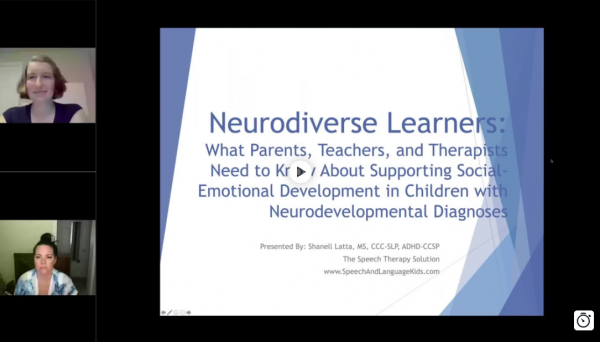
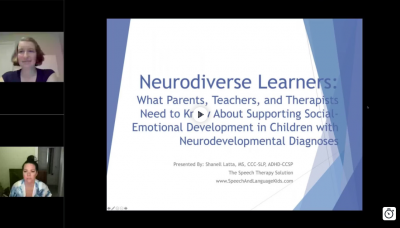
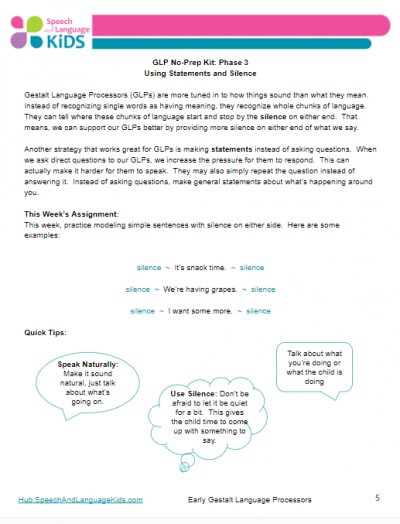
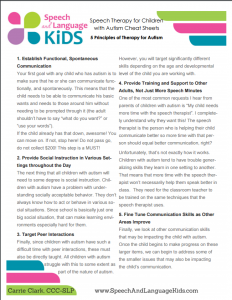
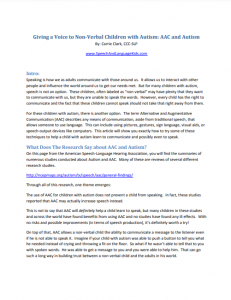
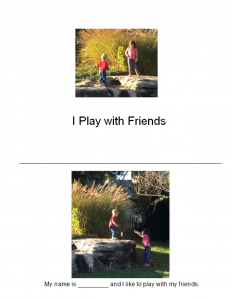





I absolutely agree! I know children who are pulled out from their classroom for individual speech therapy 4 times weekly and they are unable to generalize their skills. On many occasions, I have overheard children speaking 1-2 word phrases in the speech room but throughout my counseling sessions they don’t produce/imitate speech. I also agree with collaboration between therapist, teachers, and caregivers. We as therapist, must provide strategies and tools to everyone involved in the child’s life. We must be consistent. I also think that push- ins are just as important as pull- outs for generalization to occur.
Absolutely! I’m glad you agree!!
Hi there Carrie. Question for you. I’m an SLP working in a school setting, and there has been some running debate for a number of years between SLPs, psychs, and social workers as to the efficacy of training social skills in a pull-out setting. Some say that it’s completely ineffective and that there is research to show this (because of the generalization issue), while others insist that we do need to be doing some training in a separate setting. Are you familiar with any peer reviewed resources stating either side of the argument?
I am not familiar with the specific peer-reviewed research but I suspect that even if there were studies out there, they could not possibly predict success for every child. I think this is an issue that is different for every child. Some children do well learning those skills in a quiet environment before generalizing them to the regular classroom while others won’t benefit at all from practicing those social skills in a different setting. Plus, in my experience, as each child learns and grows, his needs will change as well so a child who once needed all therapy in the regular classroom may eventually get to a point where he is ready to practice skills in a different setting first where it is low stress and then try it in a regular education environment. I think the most important thing to do is to pay attention to how each child learns and take a guess as to which setting will work the best for that specific child. Then, take great data to show whether that type of therapy is effective or not and change the plan if you see it’s not working.
Thanks for the thorough response!
Sure thing!
One thing that would be awesome to add here would be the vital importance of peer-modeled language and interaction for children with autism. In place of additional time with an SLP, taking a karate class or soccer class or just being at the playground or a play place with other kiddos (instead of in front of a device) would be awesome for development of age-appropriate speech and language. Kids with autism need space and time to be regular kids and no SLP is going to be able to model that in the speech room like a same-age peer could! Thanks for the thought-provoking post Carrie!!
Absolutely! I couldn’t agree more. Sorry I forgot to mention that!
Thank you! Great article…as many times as I explain these
points during IEP meetings sometimes it helps when it comes from from someone else…especially in print!
No problem! Glad I can help!
You’re right on target! Often times language skills for the older student on the Spectrum are referred to as embedded skills, they are communication skills that are worked on throughout their day, embedded within the activities they are doing. We as Communication Specialists are not only teaching the student, we also need to be teaching the staff working with the students that are with them all day, every day. We need to continue working with the parent as well, no matter what age the child is.
I couldn’t agree more!! Thanks for your comment!
Hi Carrie, do you happen to know of any research articles that support this? If so, can you share them?
I have a 6year old student who has autism and is non verbal. She was evaluated by a well known Center for Autism and they recommended that she receive “intensive speech and language therapy” so that year she received 5-30 minute sessions weekly, 3 individually and 2 group. She made a little progress and during the annual review-I wasn’t there- it was recommended by the speech pathologist to drop this to 15 minutes a week. Also, the Pathologist has all kinds of free time in her schedule. In fact all 6 of my kids went from 250 minutes a week to 15 minutes a week. Does this seem like enough therapy for students who do not have functional communication systems and get angry when staff can’t tell what they want and they become frustrated and then angry?
My sister has autism and thanks to speech pathologists like you she can communicate with us. She stopped going to a pathologist over 10 years ago but I am and always will be grateful for the therapists who helped her. I agree with your assessment of non-generalized skills in her speech and communication. For example, she can say phrases if we prompt her but won’t do it on demand. Is there any way we can help her speak in sentences all the time and not just in one or two word phrases? She is 17 now so it might be too late; even if she can’t progress in her speech I just wanted to express my gratitude to the wonderful people of your profession.
Hi, Isa-
Hello! Thank you so much for reaching out. Unfortunately, we get a ton of questions every day about how to solve specific speech/language problems. Since we have such a small staff, we aren’t able to answer every question that comes through on the website, social media, or via email. If you are a parent, we suggest you reach out to a local speech-language pathologist who can work with your child directly and answer your question.
If you are another speech-language professional, we have created a membership where we pay a full staff to answer questions like this on a regular basis. We would be more than happy to answer your question inside the membership program. We’re able to answer more questions in here because we have a full library of questions that we’ve already answered so our staff can either link you to the answer if it exists, or write you a custom response if needed. We’d love to see you inside the membership!
Click Here to Become a Member: https://www.slpsolution.com/pediatric-signup/.